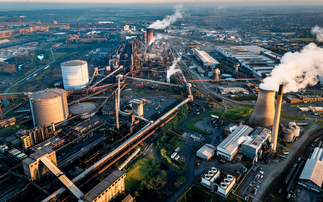There are only 18 months to go until the UK leaves the single market and customs union - and the plans for a 'Green Brexit' look worryingly sketchy
Winter is coming. With parliament on its summer recess it would be nice to characterise the current period as the calm before the storm, but it's not really that calm.
From a holiday villa in Greece, the former chief of staff at the Department for Exiting the EU hurls Twitter grenades at the Brextremists he fears are about to obliterate the UK's economic competitiveness for several generations. Leave commentators respond with an angry twitchiness that hints at the steady erosion of the once impenetrable confidence with which they set the country on this tumultuous course. Leave campaigners argue, seemingly seriously, that the UK should leave Brussels without contributing a single penny to Nigel Farage and his fellow MEPs' pensions. Gina Miller faces the abomination of threats of violence, further underscoring quite how low things have sunk. Meanwhile, the Cabinet and Shadow Cabinet stretch out on their sun loungers and try to forget the fact they are irrevocably split on the biggest challenge the UK has faced since VE Day.
It would all be darkly comic, were it not for the fact that Michel Barnier's clock keeps ticking. The two-year negotiation period that Article 50 allows has been referenced so often that you get the impression this 24 month period of limbo has seeped its way into the public consciousness, feeding the impression Brexit will always be two years hence. But time has not stopped, no matter how much Theresa May must wish it so. Departure is now little over 18 months away. You couldn't build a skyscraper in 18 months, you couldn't build a train station, I've seen suburban extensions that took longer to complete - and the government is meant to complete one of the most daunting political construction projects of all time.
The UK government now has 18 months to build the governance equivalent of a transatlantic bridge. I'm not mixing my metaphors here; I'm not suggesting the government has to build the governance equivalent of closer geopolitical ties with the US. It has to build the equivalent of an actual, physical 4,000 mile long bridge, probably with an escalator to the moon included.
The embryonic calls for a public inquiry when all this is done and dusted already feel justified and prescient. Parliament's vote to trigger Article 50 before even the vaguest outline of a credible negotiating strategy was completed will go down as an abrogation of responsibility of historic proportions.
Come September we will have passed the 18 month milestone and the ticking clock will start to become deafening. Reports from David Davis' pre-summer meeting with top business leaders revealed he was warned that if there wasn't some clarity by early next year then "appetite for risk would run out". The contingency plans that many businesses have developed while the government has been paralysed by political posturing are waiting to be triggered. If they are quietly enacted the current slowdown in economic indicators could quickly become critical. Even kicking the can down the road through a transition period agreement will struggle to alleviate their concerns. Expect more companies to follow the lead of green retail outfit Lush and either publicly or privately shift the focus of their investment plans overseas.
This weekend's supposedly unifying intervention from Philip Hammond and Liam Fox will have only served to increase the likelihood of such migration. The confirmation the government intends to leave both the single market and customs union in March 2019 suggests Ministers think they can deliver a completely bespoke transition deal with the EU covering everything from border checks and immigration controls to air traffic control rules and regulatory frameworks in less than 18 months, before then asking Brussels to sit down to agree a separate bespoke final deal. It is highly questionable as to whether this plan had been floated with other EU governments before its newspaper editorial unveiling. Either way, the cliff edge everyone says they want to avoid just moved closer.
All of which makes now a good time for the green economy to take stock of the current status of the Brexit process and the progress that has made since last year's referendum; to ask the question, are we heading for a green Brexit or not?
The good news is there is some good news. Predictions of an economic crash have not yet come to pass, even if the warning lights on the dashboard are flashing. Clean tech exporters are benefiting from the weakness of the pound. Calls for a post-Brexit bonfire of environmental regulations have faltered (for now) in the face of public opposition and the daunting complexity of the Repeal Bill. Three leading electric vehicle (EV) manufacturers - Nissan, LEVC, and BMW - have reiterated their commitment to the UK. As Sky's Faisal Islam pointed out, BMW's decision to assemble its electric Mini in Oxford only extends into the early 2020s (ie the likely end of any Brexit transition period) and is in no way an endorsement of the prospect of the UK reverting to WTO terms and tariffs. But it remains a significant vote of confidence in the government's EV plans.
Most importantly, Environment Secretary and arch-Brexiteer Michael Gove has declared unequivocally that he will pursue a 'Green Brexit'. Assurances have been given that current environmental regulations and standards will remain in place. Support has been voiced for an overhaul of agricultural and fisheries policy that puts the environment front and centre. Gove has even split with his fellow Brexiteers in cabinet by insisting he will not countenance a watering down of food standards in pursuit of a US trade deal.
With the eye for an angle and ear for public opinion that helped him win last year's referendum, Gove has singled in on the clearest upsides Brexit could bring. He is already moving to realise some of the environmental and economic benefits that could result from leaving the common agricultural and fisheries policies. He seems to have recognised that Liam Fox has even less chance of convincing the British public of the merits of chlorinated chicken than he has of convincing those with a long memory that he is deserving of his cabinet seat.
Massive questions remain over Gove's ability to deliver on this grand vision. Would his opposition from Defra really stop a US trade deal being signed that opens up the UK to whatever agricultural horrors President Trump favours? Can he face down a powerful farming lobby backed by even more powerful landowning interests? How do you square the circle presented by fishermen who want to fish more and scientists who insist they should fish less?
But when coupled with the government's imminent Clean Growth Plan, Gove's ambitious plan for a Green Brexit suggests the low carbon economy might just be able to weave a path through this most volatile of periods. Markets for clean technologies and greener business models should continue to be driven by unstoppable global trends, even if the Brexit-related headwinds do their worst. It is encouraging that Gove and unlikely allies in the Cabinet such as Greg Clark and Philip Hammond seem to recognise this fact.
The problem is that is where the good news ends. As has always been the case with Brexit the list of risks far exceeds the list of benefits.
You could fill a book on the challenges ahead - indeed several people already have - but there are a few harsh realities all green business leaders need to be aware of.
The most imminent is the fact there is, in Caroline Lucas's words, 'an environment-shaped hole' in the Repeal Bill. As Green Alliance's Shaun Spiers told Gove at the think tank's summer reception, the draft bill is simply not good enough from an environmental perspective, lacking explicit guarantees on green protections and clarity on how EU regulations will be enforced and policed post-Brexit.
MPs are already talking about "stringing the bill up like a Christmas tree" with amendments that will seek to tempt the small number of parliamentary rebels required to make the government re-think its plans. With environmental amendments likely to have strong public and cross-party support, expect them to feature heavily in the bill's passage.
All of this will take up yet more precious time and further complicate the government's attempts to address the other big challenge for green businesses: the risk of zombie legislation. This is a field so complex and, let's be honest, boring, that it has been afforded scant attention to date. But awareness is growing, as evidenced by the recent flurry of news stories about the UK's future relationship with Euratom. The realisation the development of an industry that carries with it both nuclear safety risks and government hopes for the decarbonisation of a large chunk of our power supplies could now be jeopardised (along with the availability of cancer drugs) by confusion over government oversight is sobering. We have no idea how our radioactive isotopes are going to be regulated, and it is still impossible to find anyone with any nuclear expertise who thinks leaving Euratom is a good idea. But there is a similar lack of clarity over the regulation of chemicals, air, water, product standards, and industrial sites, all of which will start to impact investment decisions in the not too distant future.
As a number of commentators have started to inquire, if we really are leaving the EU in 18 months where are the offices and recruitment plans for new regulators and agencies? Where is the huge increase in budgets for the Environment Agency? Why are these questions not being asked, let alone answered?
This regulatory uncertainty is further fuelled by the political instability that was unleashed by David Cameron last year and refuses to dissipate. The Repeal Bill's transfer of EU rules and Gove's promises of a Green Brexit are welcome, but they are diluted by Theresa May and Jeremy Corbyn's inadvertent conspiring to deliver a Hard Brexit that could cripple the economy and sever the UK's future relationship with the EU's environmental standards. When a prospect as ridiculous as Jacob Rees-Mogg or Boris Johnson as Prime Minister is seemingly given credence by supposedly serious people, the risk of an abrasively right wing government with scores to settle against climate change action in general and hairdryer energy efficiency standards in particular remains higher than at any point in modern history.
This risk matrix is further complicated by the on-going lack of clarity over the future of immigration policy. The green economy is by definition internationalist in its goals and outlook. The labour market is relatively fluid across the full spectrum of the salary scale, from the agricultural and construction workers who feed Britain and make low carbon infrastructure possible, through the engineers and researchers who nurture clean tech innovations, to the entrepreneurs, financiers, and investors who help turn these technical breakthroughs into reality. Whether the responsibility lies with the UK's flawed teaching of STEM subjects or the forces of globalisation, UK low carbon projects such as Hinkley Point, the next wave of offshore wind farms, and the electric vehicle charge point roll out will all draw on imported labour from the EU, just as the agricultural sector remains reliant on Eastern European workers to stop produce rotting in the fields. Businesses and investors planning such projects now have to consider that staffing them could be about to get a lot more complicated.
Meanwhile, it is increasingly evident that plans for a new wave of UK trade deals will bring with them significant environmental risks. The hope remains that trade deals with the EU, US, China, Australia, Canada, India, et al will aid an export-driven boom in UK clean tech as the world decarbonises. Such a vision remains possible, and it is important to note long-running negotiations for a WTO Environmental Goods Agreement are continuing. But it is impossible to deny that the election of President Trump has thrown an oil-soaked spanner into the blueprint for a Global Green Britain.
Modern trade deals are as much about the removal of non-tariff barriers through regulatory convergence as they are about axing tariffs and as such trade politics are dominated by the world's two biggest markets, the EU and the US, with an increasingly bold China also flexing its muscles. In future trade talks the EU is in such a dominant position that the UK will have little choice to accede to most of its regulatory demands if it wants tariff-free access to the bloc. Remember, the EU's red line is already clear: "Any future agreement between the European Union and the United Kingdom is conditional on the UK's continued adherence to the standards provided by international obligations, including human rights and the Union's legislation and policies, in, among others, the field of the environment, climate change, the fight against tax evasion and avoidance, fair competition, trade and social rights, especially safeguards against social dumping". Energy standards for hairdryers are staying if you want to sell into the EU.
As has been widely noted, this is the worst of both worlds, as many UK firms will effectively have to adhere to EU regulations without any influence over their development. But it gets worse still, because in parallel to this deal the UK would be seeking one with the US where the environmental demands would be very different. Chlorinated chicken is just an amuse bouche of what is to come, as the Trump White House calls for the UK to welcome cheap imports manufactured with a disregard for the environment and climate that the EU would never countenance. UK businesses would find themselves squeezed, having to adhere to higher standards while suddenly facing intense competition from US products made under a generally more relaxed regulatory environment. It could be the worst of both worlds cubed.
Inevitably hope remains that in a decarbonising world where environmental concerns are becoming more widespread, the UK would benefit in the long run by becoming a hub for higher environmental standards with an unencumbered export route into the US and perhaps Chinese and Indian mega-markets. But in the short term rushing to buy up swimming pool soaked chicken from the pollutocrats in the White House looks like an extremely tough sell politically with potentially damaging consequences for many British firms.
All of these concerns only serve to augment the big over-arching dread, the fear that has some politicians talking of 'country before party' and others mulling everything from a second referendum to the launch of a new centrist party: self-induced economic recession; a lost decade as wilful policy choice.
A Brexit, even if it is relatively soft, that fails to transition pretty seamlessly to life outside the EU risks an economic crunch as policy uncertainty dents investor confidence. A hard Brexit that brings customs checks, tariffs, and a loss of passporting rights for The City threatens an economic cataclysm that could take years to recover from. Under such a scenario, what happens to the UK's plans to make The City a green finance hub? What do the offshore wind turbine manufacturers do when every blade shipped across the North Sea requires its own weight in paperwork? What do the EV firms, the nuclear R&D projects, and the graphene innovators do when Emanuel Macron rolls out the green carpet for them?
The green economy benefits from a degree of geographical rigidity. The UK will still need clean power, green heat and low carbon transport whatever happens. But at the same time, for the last seven years we have been told the UK cannot afford to make improving energy efficiency an infrastructure priority, despite compelling evidence that such a move would deliver wider economic benefits than most infrastructure projects. Imagine making the case for green infrastructure investment when the Treasury is downgrading its tax receipts with each finance firm heading to Dublin and Amsterdam. Something tells me the promised £350m that never really existed and has little hope of making its way to the NHS is not about to be diverted to pay for green home upgrades.
All of this can yet be averted, either through a coherent and professional approach from the government or, if that is not possible, a second referendum (or perhaps even James Chapman's mooted Democrats). But either way it is long past time that such a disastrous scenario was treated as the very real possibility that it remains.
Are we heading for a Green Brexit? Who the hell knows. But there is one thing that we do know and which both sides of the Remain-Leave divide should be able to agree on. If you are committed to delivering a Green Brexit strategy then you would want to be a lot further advanced in the process than we are currently. There is just 18 months to go. Winter is coming and the UK continues to look woefully underprepared for the storms ahead.










